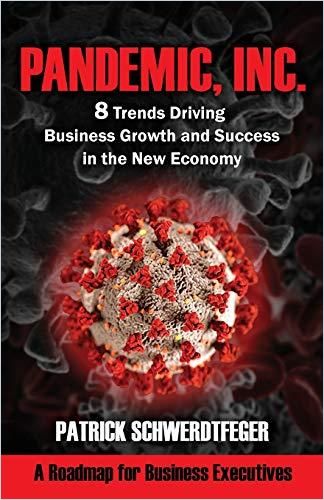Business journalist and prolific author Patrick Schwerdtfeger ventures into the trend-predicting and futurist game with mixed, but readable results.

The Post-Covid World
In this “road map” for executives, business journalist Patrick Schwerdtfeger explains how the COVID-19 pandemic reshaped the economy and redefined opportunity. Writing in 2020, he reported that the pandemic would accelerate major trends in eight areas: decentralization, exponential thinking, government, automation, virtualization, liquidity, analytics and self-sufficiency.
Schwerdtfeger helps leaders look ahead to see how the pandemic will influence the future.
New Opportunities
The COVID-19 pandemic creates business opportunities by accelerating the pace of eight business trends.
The pandemic and economic aftermath will accelerate the demise of old-school companies.Patrick Schwerdtfeger
The first letter of each trend forms the acronym “SALVAGED”: “Self-sufficiency, analytics, liquidity, virtualization, automation, government, exponential thinking and decentralization.”
Self-Sufficiency
As people pursue self-sufficiency, Schwerdtfeger expects homeowners to adopt solar panels more quickly. Solar panel prices have plunged by 90% since 2015. When off-the-grid energy becomes cheaper than electricity from utilities, he maintains, a mass switch to solar energy will ensue.
Here, Schwerdtfeger ventures onto the rocks of futurist predictions. Big oil and power companies are, in fact, doing everything they can to prevent mass solar adoption in the United States. State governments, especially in red states, have enacted legislation severely curtailing the financial benefits of installing home solar panels, though new federal legislation offers incentives.
The post-pandemic surge in gig work, self-employment and remote work means that contract employees may make up almost the entire staff of some companies. More people now work from home than from office buildings. On a macro level of self-sufficiency, and in line with Schwerdtfeger’s line of thinking, the United States reduced its dependence on foreign oil during the pandemic, becoming a net exporter of energy for the first time in decades.
Analytics
The accelerating trend toward storing and analyzing massive amounts of digital data emerged in 2011 and 2012 as storage costs plummeted. For example, the cost of storing one terabyte of digital data fell from $17,000 in 2000 to $3 in 2020. Big data enables Google advertisers to target users by geography, demography and favorite websites.
Liquidity and Virtualization
The economic impact of the pandemic provides an unwelcome reminder that the survival of any business depends on financial liquidity. Without any money coming in, most businesses would exhaust their cash within a few months. Entrepreneurs should preserve liquidity and resist the urge to rebuild business models during the pandemic.
Wherever possible, the world is going virtual. Patrick Schwerdtfeger
The pandemic amplified the proliferation of virtual business meetings via Zoom, Slack and similar online platforms. Thus, the market for commercial office space declined and, the author believes, will continue to decline. By closing schools, the pandemic reinforced a trend toward virtual education.
Automation
Automated jobs fall into four categories: “repetitive manual, nonrepetitive manual, repetitive cognitive and nonrepetitive cognitive.” Algorithms will replace cognitive workers just as robotic technology will replace manual workers.
Nonrepetitive tasks will define the jobs of the future.Patrick Schwerdtfeger
By 2025, Schwerdtfeger predicts, owning an electric car will be cheaper than owning one that runs on gas. The average electric vehicle has fewer than 100 moving parts, compared to approximately 2,000 in the average gas-powered car. The battery is its costliest component – but battery prices have fallen.
Governmental Influence
Governments gained power during the pandemic as they mandated quarantines and face masks. Government activity generally raises the standard of living, according to measures of human progress, such as life expectancy, infant mortality, incidence of poverty, and death by disease or natural disaster. Those are convincing metrics; here Schwerdtfeger aligns with, for example, bestselling author Steven Pinker, who argues in several books that human life is improving.
The world is getting better, not worse.Patrick Schwerdtfeger
Exponential growth occurred in other areas, notably in the number of COVID-19 cases in the United States, which doubled in the pandemic’s early stages from 75,000 to 150,000 within a week, and doubled again to 300,000.At the same time, the United States, Germany, Japan and South Korea have embraced new technologies and maintained lower levels of unemployment than most other countries.
Decentralization
The trend toward decentralization affects energy, money and the news media, which now includes bloggers, social media influencers and podcasters .
Decentralization also extends to financial transactions involving bitcoin and other cryptocurrencies. Blockchain technology enables decentralized, consensus-driven cryptocurrency transactions among parties who need not trust one another to carry out transactions. Properly deployed, “blockchain automates trust,” because no one has ever hacked the bitcoin blockchain.
Recent events involving the collapse of notable bitcoins and bitcoin investors suggest that Schwerdtfeger was, like almost everyone else in 2020, over-optimistic about that technology.
The Periphery
People see what draws their focus, which is one reason that innovations which disrupt entire industries often emerge from outside business leaders’ everyday focus.
We only see what we’re focused on.Patrick Schwerdtfeger
For example, LinkedIn disrupted the talent recruitment business, Amazon the book business, and Apple the music and smartphone industries. The lesson: Pay attention to the fringes.
Hits and Misses
Futurism is a risky but lucrative business. Consider the mega-success of groundbreaking futurist blockbusters such as 1985’s Megatrends by John Naisbitt or Alvin Toffler’s 1970 Future Shock. Those authors published in times of exponentially less acceleration, so changing events did not prove them wrong mere months after their books were published.
Schwerdtfeger is not so lucky, though kudos to him for seeing that the pandemic will have a powerful role in shaping the future, and going a step beyond. He carries on about self-driving trucks, when recent news makes it clear that any functional model will not appear until far in the future. He runs into similar problems regarding bitcoin and solar power. Schwerdtfeger is a prolific, engaging author, however, and his vision of the future is intriguing, if flawed.
Patrick Schwerdtfeger also wrote Anarchy, Inc.: Profiting in a Decentralized World with Artificial Intelligence and Blockchain; Marketing Shortcuts for the Self-Employed: Leverage Resources, Establish Online Credibility and Crush Your Competition; Webify Your Business: Internet Marketing Secrets for the Self-Employed; and Keynote Mastery: The Personal Journey of a Professional Speaker.






